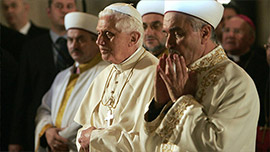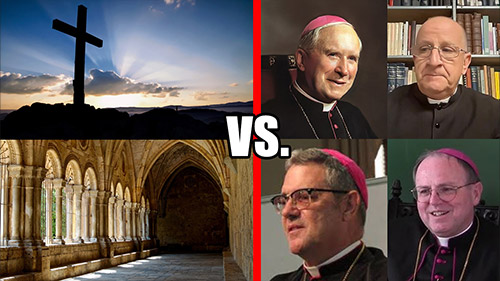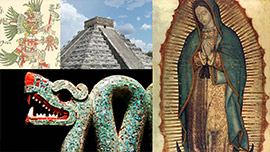 | vaticancatholic.com - English Channel |
Faith & Doctrine | Lives Of Saints | Spirituality & Prayer | Traditional Catholic Issues Bro. Peter Dimond People who believe, contrary to Catholic teaching, that baptism is not necessary for salvation often bring up the case of St. Emerentiana, an early Church martyr and virgin. They think she is an example of an unbaptized person the Church says is in Heaven. This video will show why their argument is false. The Church actually teaches that all the martyrs, such as St. Emerentiana, received the Sacrament of Baptism. Those who think that St. Emerentiana was saved without baptism often cite the reading for her feast on Jan. 23 in the Roman Breviary (which comes from the Roman Martyrology). It says that St. Emerentiana, while still a catechumen, rebuked idol-worshippers and was stoned by them, thus being “baptized in her own blood”.
We will make a number of points in response to this argument. First, the historical accounts in the Roman Breviary (which are called legends, meaning things to be read) are not infallible. This is widely admitted. I will first quote Fr. Frederick William Faber, a pre-Vatican priest and author, who states:
Pre-Vatican II theologian Tanquerey also stated:
Martyrologies and the Breviary have both been reformed and corrected. In 1629 Pope Urban VIII instituted a special congregation for the Reform of the Breviary:
Concerning that reform, Papal Historian Ludwig Von Pastor notes:
Pope Benedict XIV also said this in his 1756 encyclical Ex Quo Primum:
Thus, just because a reading in the Breviary claims that St. Emerentiana was a catechumen does not prove that she was a catechumen. That reading is not infallible or de fide. However, and this is very important, the reading for her feast does not even say she was unbaptized. That’s because the term ‘catechumen’, although it usually refers to an unbaptized person, can refer to a baptized person, as we will see. Moreover, the terms ‘baptism of blood’ or ‘baptized in blood’ can simply refer to the Catholic martyrdom of an already-baptized person. We give various examples of this in our material. Examples include: The Acts of the Martyrdom of Sts. Perpetua and Felicitas, which describe the martyrdom of already-baptized people as a second baptism.
St. John Chrysostom also calls the martyrdom of a baptized priest St. Lucian a baptism. In regard to the term ‘catechumen’: Canon 12 of the Council of Nicea prescribed penance for certain soldiers (including baptized soldiers), and this included having to spend time among the 'hearers'.
Those 'hearers' were sometimes identified in Latin as 'catechumens'. An example of this is found in the translation of canon 12 of Nicea in St. Robert Bellarmine's work on Councils (Book II, Chap. 8).
The final part of the canon, as it appears in Bellarmine’s work, says: “these are to spend ten years among the penitents after they have been among the hearers, that is, the catechumens, for a period of three.” So, baptized soldiers undergoing penance had to spend time among the hearers or catechumens. This is just one example of how the term catechumen didn’t always refer to an unbaptized person. Hearers or catechumens were people receiving aural instruction. Such additional instruction could be prescribed for certain penitents or for people not very well educated at the time of their baptism. Moreover, since the incorrect view that a heretic could not perform a valid baptism was widespread in the ancient Church at times and held by various Church fathers, it’s reasonable to conclude that many people who had in fact been validly baptized in water by heretics were, upon conversion in some areas, wrongly classified as unbaptized catechumens. The general points we are covering about St. Emerentiana also apply to the handful of other times in the Roman Breviary where a saint is identified as a catechumen or having been baptized in blood. To conclude these preliminary points: not only is the historical reading in the Roman Breviary for St. Emerentiana not infallible, there is nothing in it that says she was unbaptized. Now, what’s additionally important is that a number of the older martyrologies don’t say anything about St. Emerentiana having been a catechumen or having been baptized in blood. For example, in the martyrology of Venerable Bede (who died in 735), there is an entry for St. Emerentiana. It says the following:
As we can see, she is not said here to have been a catechumen or baptized in blood. St. Emerentiana was the foster-sister of St. Agnes. Agnes had been martyred a few days before St Emerentiana’s death. Since it was the teaching of the Church to baptize unbaptized catechumens in a necessity or during a persecution, it makes sense that St. Emerentiana would have been baptized before exposing herself to danger at the tomb of St. Agnes. In De Locis Sanctis (On the Holy Places of the martyrs which are outside the city of Rome) dated to the 7th century, it simply lists the martyr Emerentiana as the sister of St. Agnes. There is no claim that she was a catechumen. (http://csla.history.ox.ac.uk/record.php?recid=E06997) In a 7th century document called Notitia ecclesiarum urbis Romae (Catalogue of the Churches of the City of Rome), it calls Emerentiana a martyr. There is no claim that she was a catechumen. (http://csla.history.ox.ac.uk/record.php?recid=E00676) In a manuscript of the Martyrologium Hieronymianum (Martyrology of Jerome), which is considered to be perhaps the oldest surviving Latin martyrology, there is a probable reference to Emerentiana simply as a martyr. It does not say she was a catechumen. (http://csla.history.ox.ac.uk/record.php?recid=E04620) Thus far we’ve shown, among other things, that: 1) the historical readings in the Breviary are not infallible or de fide, and some of them have been corrected; 2) there is nothing even in the current Breviary reading that says St. Emerentiana was unbaptized; and 3) a number of presumably older references to Emerentiana say nothing about her having been a catechumen. Now we come to the most important point, which is that we know St. Emerentiana received the Sacrament of Baptism because, among other things, it was dogmatically defined by Pope Benedict XII that all martyrs, confessors, virgins and other faithful in Heaven from the New Testament period received the sacred baptism of Christ, which is the term for the Sacrament of Baptism. The pope defined that they received the same baptism as children, which is of course water baptism. He mentions no exceptions because none exist. You will find that information here (as well as in the video linked on this page): https://vaticancatholic.com/pope-benedict-xii-baptism-heaven/ The same truth that no one, including unbaptized catechumens in necessity, persecution, danger, etc., can be saved without water baptism, is found in the teaching Pope St. Leo the Great: https://vaticancatholic.com/pope-leo-the-great-sacrament-of-baptism-salvation/ These facts show that the Church teaches that all the martyrs in Heaven from the New Testament period have received the Sacrament of Baptism and that receiving water baptism is the singular safeguard of salvation for everyone, including unbaptized catechumens in persecution. These facts refute ‘baptism of desire’ and ‘baptism of blood’. We could cover much more dogmatic evidence to prove the point, as we do in our material, but it suffices to say that it’s a dogma that unless man is born again of water and the Holy Spirit he cannot enter the Kingdom of God. This was taught by the Councils of Florence and Trent. Thus, no one can enter the Kingdom of Heaven without the Sacrament of Baptism. We will not cover all of the other evidence on this, but we will simply quote these statements from the Council of Trent.
Finally, there is an important reading in the Roman Breviary for the 4th day within the Octave of the Sacred Heart. Providentially, this was added to the Roman Breviary by Pope Pius XI in 1929. It powerfully affirms the true position on baptism. It states:
So here, in the Roman Breviary for the 4th day within the Octave of the Sacred Heart, we see an explicit affirmation of the Church’s true teaching that no one can get to Heaven without the Sacrament of Baptism and that this is what Holy Mother Church confesses everywhere throughout the world. This is what we find in all dogmatic and infallible pronouncements on this matter. Copyright © 2021 Most Holy Family Monastery |
Was St. Emerentiana Baptized? Unbaptized Martyrs?
November 19, 2021
SHOW MORE
















